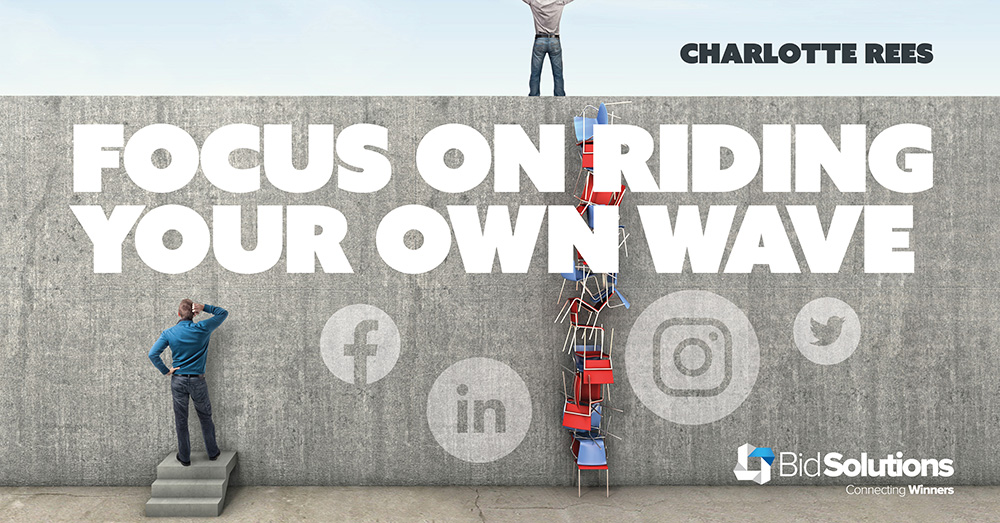
You scroll through LinkedIn and see another promotion. You watch Instagram stories of people living incredible, happy lives. You listen on a Teams call as one of your fellow colleagues gets fantastic feedback on their bid. You read an article about the perfect work-life balance.
You compare yourself. Maybe you feel disappointed, anxious or like you’re not enough. We’ve all been there.
With social media and the return of socialising and networking, it’s really easy to look at what others are doing and feel pressure to do better, and to do more. This pressure can take many forms: committing to doing too much, over-working, feeling anxious about being good enough, or maybe just making you feel totally deflated.
Why do we feel like this?
It’s normal to compare yourself to others. We all have an innate desire to understand where we fit in, and understand if our lives and careers are ‘on-track’. The bids and proposals industry is currently experiencing astonishing growth and competition for talent. This makes it easy for everything to feel pretty overwhelming, especially as competitive bid professionals. We can’t help but want to strive for more!
Take a step back
We’re all on our own journey. There are some people thriving, some just chugging along, others who are really struggling to keep afloat, and some who feel as though they’re drowning. And to make things even more confusing, these feelings can change from one day to the next.
Yesterday you may not have thought about where you are in life. Today, you suddenly struggle with a challenging stakeholder, and now you’re questioning your skills and if you’re good enough for your role!
How can we ‘ride the wave’?
We can take inspiration from others’ success without comparing ourselves negatively. Here are some tips:
- Remember social media isn’t always representative of real life! People show you what they want you to see. Through carefully curated content, they only show you a small, selected part of their everyday lives.
They won’t always share the details about their terrible day at work on LinkedIn, or tell you how they feel completely undervalued by their team. While you may think you’re alone in feeling a certain way, there’s a strong chance there are millions of others who are going through the exact same thing. (Groups such as WIBAP are great for connecting with others in a more down-to-earth way!)
- Consider who you surround yourself with, and who and what you’re following. The people and content you engage with can have such a strong influence on how you feel. If you start noticing that someone or something is making you feel worse about yourself, it might be a good idea to reduce your interaction. This could mean unfollowing, steering discussions in a more structured way or, where possible, taking yourself out of the conversation.
This can be tricky in a professional environment, but think about what’s right for you. What’s going to have a positive and motivating impact? This is what you need more of!
- Learn to understand your triggers. If you notice that your anxiety or negative feelings are triggered by similar things, it’s worth reflecting on the reasons behind why they’re consuming your thoughts. You can then start to explore these reasons and take action to address them, make positive changes or set new goals.
For example, if you’re frustrated to hear the benefits of flexible working, but your employer is strict on being in the office 9 to 5 every day, it’s likely this will continue to be a trigger until your situation changes. Could you have discussions about trialling a more flexible pattern? Or do you need to find a new opportunity if this is now a priority?
- Step back to acknowledge the small wins. In our profession, it’s easy to let the small wins go straight under your radar! Maybe you managed to influence a tricky stakeholder, logged off on time today, or were happy with an executive summary you wrote – WELL DONE!
These small wins shouldn’t go unnoticed. While you may feel stuck or deflated, you’re probably still doing awesome things along the way. Don’t ignore them!
And for managers and team leaders: do you celebrate the small wins? Could a compliment or a “well done” brighten the day of someone in your team? Let’s not forget to shout about great achievements – no matter how big or small.
We’re not living life on a timeline. If you’re not a manager by a certain age, it doesn’t mean you’ve failed. If you’re not as happy as you’d like to be in your current role, but not yet ready to take action, that’s okay. If you have days where you feel unsure about what’s next for you, don’t panic.
You’re on your own career journey and you’ll always be developing and learning and doing great in your role. It doesn’t mean you can’t aim for more, but give yourself a break and do it on your own terms, not other people’s.
It’s important to remember that there’s support out there. If you ever feel like you want more information or support for your mental health, don’t wait to reach out for help – whether that’s through talking to a friend or seeking professional help or advice. For more information on what’s available, visit https://www.nhs.uk/mental-health.
This article was written by Charlotte Rees.

